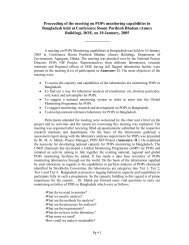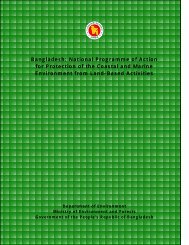Draft CMP HH - the Department of Environment
Draft CMP HH - the Department of Environment
Draft CMP HH - the Department of Environment
You also want an ePaper? Increase the reach of your titles
YUMPU automatically turns print PDFs into web optimized ePapers that Google loves.
Coastal and Wetland Biodiversity Management Project BGD/99/G31<br />
Hakaluki Haor <strong>Draft</strong> Conservation Management Plan<br />
7.3.4 Alternative Sustainable Livelihoods<br />
The communities living in and around Hakaluki Haor are one <strong>of</strong> <strong>the</strong> major sources <strong>of</strong> direct<br />
anthropogenic pressure impacting habitats, biodiversity, and resources <strong>of</strong> <strong>the</strong> ECA. The only real<br />
way to bring <strong>the</strong> local community alongside with <strong>the</strong> objectives <strong>of</strong> biodiversity conservation will be<br />
to provide <strong>the</strong>m with alternative means <strong>of</strong> generating an income. However, <strong>the</strong> identification <strong>of</strong><br />
alternative income generating activities should be an exercise that is undertaken with <strong>the</strong> full<br />
participation <strong>of</strong> relevant stakeholder groups in a manner that is meaningful such that it takes into<br />
consideration <strong>the</strong>ir lower economic status, restricted ability to make choices, and limited capacity to<br />
voice <strong>the</strong>ir concerns and interests. Essentially, choices concerning a change in livelihoods should be<br />
made by those, and only those, groups concerned. O<strong>the</strong>rwise, <strong>the</strong>re will be no support for <strong>the</strong><br />
process and any move to initiate (or support <strong>the</strong> initiation <strong>of</strong>) alternative IGA will ultimately fail in<br />
<strong>the</strong> long-term.<br />
Management Actions<br />
• Identify o<strong>the</strong>r projects and programmes already working with local communities to introduce<br />
alternative income generating activities and develop mechanisms and strategies which build<br />
upon <strong>the</strong>se efforts to support biodiversity conservation and natural resources management<br />
• In collaboration with local community groups and relevant government agencies identify<br />
suitable alternative income generating activities which can be effectively introduced. Consider<br />
options such as:<br />
� Aquaculture<br />
� Tourism activities<br />
� Fruit trees<br />
� Handicrafts<br />
� Honey<br />
� Bamboo and cane furniture<br />
� Organic farming<br />
� Medicinal plants gardens<br />
� Floating nurseries/ gardens<br />
• For each alternative income generating activity identified assess parameters such as:<br />
� Number <strong>of</strong> people involved<br />
� Productions potential<br />
� Power source required (electricity,<br />
gas)<br />
� Use <strong>of</strong> raw materials and potential<br />
impact on <strong>the</strong> environment<br />
� Potential income<br />
� Ownership<br />
cooperative)<br />
(private, family,<br />
� Division <strong>of</strong> labour (men, women,<br />
children)<br />
� Need for loan and credit schemes<br />
� Target market (self and community<br />
consumption, local market, regional<br />
market)<br />
� Marketing channel (self, middleman,<br />
organisation)<br />
� Licensing, permits, and taxes<br />
� Local government support<br />
� Involvement <strong>of</strong> local elite<br />
� Consistency with local values and<br />
beliefs<br />
• Explore <strong>the</strong> viability <strong>of</strong> introducing schemes such as micro-enterprise development, marketing,<br />
savings and credit which help provide financial security to local communities<br />
• Introduce a programme to monitor <strong>the</strong> effectiveness <strong>of</strong> newly introduced alternative income<br />
generating activities<br />
• Work with communities to address issues and problems identified as part <strong>of</strong> <strong>the</strong> monitoring<br />
programme<br />
Prepared by UNOPS Consultant Mr. Sulma Warne August/ September 2005 for Project BGD/99/G31 41





